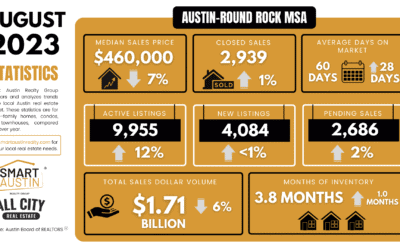December is a time for giving, but January is a time for saving, and here in Texas the saving starts on the first day of the year. January 1st is the all-important day for homeowners to take advantage of the homestead tax exemption. This article will cover the exemption in detail. Read on to see if you qualify!
What is the Homestead Tax Exemption?
The homestead exemption lowers the property tax on your “homestead” — a house, a condo, or any other manufactured home owned by you and acting as your primary residence, and only needs to be filed once after you move in-to a new property and . The property can include land up to 20 acres, as long as they are for direct use by the home and not for other purposes. You must own the property as an individual rather than a corporation or business. It must also be your principal residence January 1st of the year in which you are filing. If it is listed as your primary home after January 1st, the home won’t qualify for an exemption that year. You have until April 30th to submit your exemption application. Late exemptions are accepted up to 2 years after the delinquency date, which is usually the February 1st after you take ownership.
Texas has no state property tax, property taxes are set and collected by local taxing units which provide local services such as schools, streets, police, and fire. The homestead exemption is included in the Texas state tax code and is exercised by local taxing units.
How Much is the Exemption?
There are 2 values that are used to calculate your property’s tax burden. A market value and an appraised value. Each year the county will assess a market value for your property and notify you via mail; it may also be available on the county webpage. The market value can be contested each year, this can be done personally, or you can enroll the help of a company that specializes in appraisal protests & appeals. The appraised value is the final taxable value of the property, property taxes are a percentage of the appraised value of your property.
A homestead exemption lowers you home’s appraisal value, which in turn lowers your property taxes. This is done by utilizing 2 mechanisms: deductions & an appraisal value increase limit.
Deductions
In Texas, the general residence homestead exemption provides an automatic $25,000 exemption for school districts. For example, if you own a $100,000 house or condo, you can receive an exemption of $25,000, changing the taxable amount to $75,000. The exemption can be honored up to two years after that year’s taxes are due. The savings amount is based on many factors but in some cases, you can receive additional exemptions up to 20% of the total home value and benefit from other exemptions such as if you or your spouse is over the age of 65 or if you or your spouse suffer from physical disabilities or pass away in the line of duty. The amount can range depending on the circumstance but can go as high as a full exemption. Not all exemptions can be combined.
Appraised Value Increase Limit
Once your homestead exemption is granted, your appraisal value increase year-over-year is capped at 10%. For example, if your appraisal value last year was $100,000, the appraisal value for this year cannot exceed $110,000 no matter what the market value of the property may have increased to. The appraisal value increase cap will be particularly useful for Central Texas homeowners during this years tax season, as many properties experienced value increases well over 10%.
Central Texas Homestead Exemption Details By County
Follow the links below for more information on filing a homestead exemption in your Central Texas county.
- Travis County Homestead Exemptions
- Williamson County Homestead Exemptions
- Hays County Homestead Exemptions
- Bastrop County Homestead Exemptions
- Caldwell County Homestead Exemptions
- Comal County Homestead Exemptions
- Bexar County Homestead Exemptions
Can I Still Move Away Temporarily?
You can, as long as:
- Your principal house or condo remains your primary residents on record.
- You plan to return to your principal home.
- You are gone for less than two years. Exceptions include if you live in a retirement community or are in the military and serve away from home.
What are the Additional Exemptions?
In addition to the general residence homestead exemption, here’s a look at more exemptions you can take advantage of if you qualify.
Over 65 Age Exemption
If you are aged 65 and older (or your surviving spouse is aged 55 or older), state law allows for an additional $10,000 exemption. You may also receive additional real estate exemptions as determined by your district or county taxing units. Each will have defined minimums, such as no less than $5,000. You won’t be required to pay higher real estate property taxes as years go by – you only pay the school tax amount you paid at the time you first qualified (the first or second year you applied, whichever is lower.) This freeze on higher real estate rates is only applicable if you don’t add improvements to your home, such as a pool or garage. If you or your spouse purchase a new home for sale, this same exemption percentage is extendible to the new residence (called a ceiling transfer) if you stay within Texas and the same taxing unit.
How to Get This Exemption
Fill out an Application for Residential Homestead Exemption with your district. (See the link in our Conclusion section below). You will also need to supply your driver’s license or state-issued ID that indicated the same address as the exemption property. If you are a surviving spouse, you will be required to submit proof of your age and the proof of death of the deceased spouse.
People with Disabilities or Their Surviving Spouses
If you or your spouse has a disability, you may qualify for this special exemption. Certain disability standards from the Social Security Administration are required. A person receiving disability benefits through the Federal Old Age, Survivors, and Disability Program can also receive this benefit. If you or your spouse purchase a new condo or house for sale in the same taxing unit, you are allowed the same tax ceiling benefit as people 65 and older. All benefits remain in effect after the death of the disabled person, as long as the spouse is 55 or older.
How to Get This Exemption
Submit your application with documentation verifying your disability, such as:
- A current copy of your proof of disability from the Social Security Administration.
- A statement from a physician using a Physician’s Statement Form from TCAD as well as a copy of a recent federal tax return with the corresponding W2s.
100% Disabled Veterans or Their Surviving Spouses
Veterans with service-related disabilities who are categorized as 100% disabled and receive 100% disabled compensation or rated individual unemployability by the Department of Veterans Affairs get a full exemption for their real estate based on the appraised value.
How to Get This Exemption
If you are 100% disabled, you will need to submit an application and current documentation provided to you from the Department of Veterans Affairs. The surviving spouse can also submit an application and support documentation. The spouse may also maintain the benefit as long as she or he has not remarried and the property was the spouse’s residence homestead at the time of death.
Disabled Veteran or Survivor Exemption
Disabled veterans living in Texas with a service-connected disability of 10% or more qualify for exemptions depending on the severity of the disability. Amounts range from $5,000 to $12,000. In some cases, the full $12,000 is available for individuals with less than the 10% threshold with certain disabilities, such as being over age 65, losing a limb, or full blindness.
How to Get This Exemption
You will need to prove you are a veteran, a Texas resident, and your service branch or Veterans Administration must have classified you as disabled with a service-connected disability of 10% or more. A surviving spouse may also maintain this exemption as long as she or he has not remarried or moved outside of Texas.
Disabled Veterans Living in Donated Homes
In some cases, veterans live in real estate that is donated to them. Like the Disable Veteran or Survivor Exemption benefit listed above, this benefit is related to the percentage of the service-related disability, and the home must be the primary residence.
How To Get This Exemption
You must be classified as disabled with a minimum service-related disability of 10% or more, and submit an application, along with documentation from your service branch or Veterans Administration that indicates the percentage. A surviving spouse can also receive the benefit if still a resident of Texas and not remarried.
Special Exemption for Surviving Spouses
In general, surviving spouses receive equal benefits as long as they fit the parameters of each exemption. Some examples include being 55 or older, not remarried, and still living in Texas. But they qualify for full exemptions in certain circumstances, such as a death in the line of duty if the spouse is a member of the armed services or a first responder. Spouses will need to fulfill similar application and additional documentation provisions, including a Report of Casualty and a marriage license.
Conclusion
Since the primary residence timeline starts on January 1st, it is good to be prepared. Begin registering your home for this exemption through this link. This is a great benefit for homeowners and the exemption is ongoing. It’s a gift that keeps on giving. If you are planning to purchase a home in the Austin area, our realtors often help with implementing strategies such as this to ensure you gain the most advantages when it is time to buy. We’re here to help you in your Austin home search.




